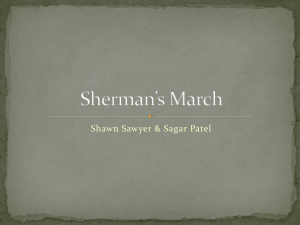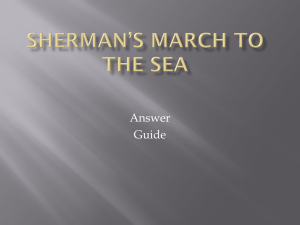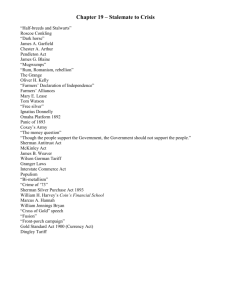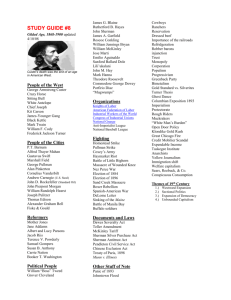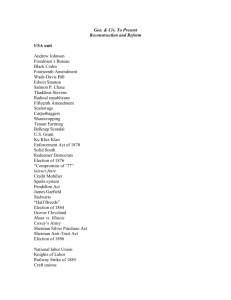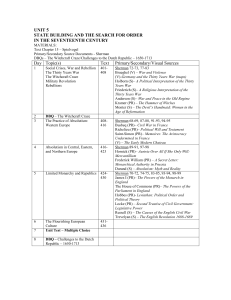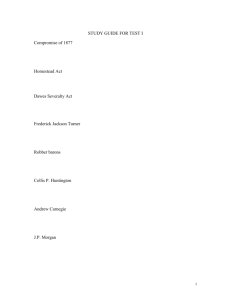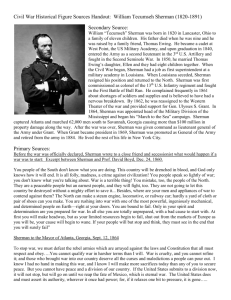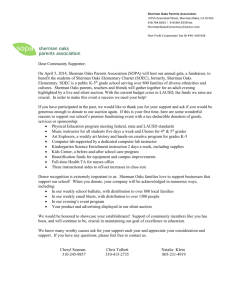Chapter 8 The Sherman Anti-Trust Act and Standard
advertisement
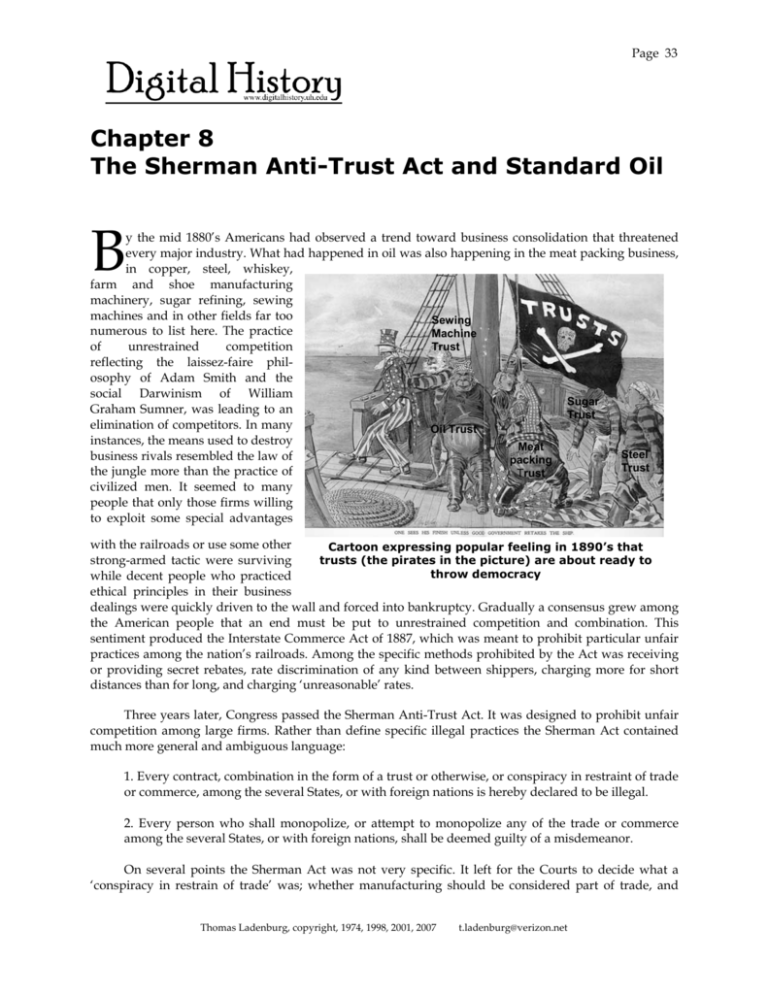
Page 33 Chapter 8 The Sherman Anti-Trust Act and Standard Oil B y the mid 1880’s Americans had observed a trend toward business consolidation that threatened every major industry. What had happened in oil was also happening in the meat packing business, in copper, steel, whiskey, farm and shoe manufacturing machinery, sugar refining, sewing machines and in other fields far too Sewing numerous to list here. The practice Machine Trust of unrestrained competition reflecting the laissez-faire philosophy of Adam Smith and the social Darwinism of William Sugar Graham Sumner, was leading to an Trust elimination of competitors. In many Oil Trust instances, the means used to destroy Meat Steel business rivals resembled the law of packing Trust the jungle more than the practice of Trust civilized men. It seemed to many people that only those firms willing to exploit some special advantages with the railroads or use some other Cartoon expressing popular feeling in 1890’s that strong-armed tactic were surviving trusts (the pirates in the picture) are about ready to throw democracy while decent people who practiced ethical principles in their business dealings were quickly driven to the wall and forced into bankruptcy. Gradually a consensus grew among the American people that an end must be put to unrestrained competition and combination. This sentiment produced the Interstate Commerce Act of 1887, which was meant to prohibit particular unfair practices among the nation’s railroads. Among the specific methods prohibited by the Act was receiving or providing secret rebates, rate discrimination of any kind between shippers, charging more for short distances than for long, and charging ‘unreasonable’ rates. Three years later, Congress passed the Sherman Anti-Trust Act. It was designed to prohibit unfair competition among large firms. Rather than define specific illegal practices the Sherman Act contained much more general and ambiguous language: 1. Every contract, combination in the form of a trust or otherwise, or conspiracy in restraint of trade or commerce, among the several States, or with foreign nations is hereby declared to be illegal. 2. Every person who shall monopolize, or attempt to monopolize any of the trade or commerce among the several States, or with foreign nations, shall be deemed guilty of a misdemeanor. On several points the Sherman Act was not very specific. It left for the Courts to decide what a ‘conspiracy in restrain of trade’ was; whether manufacturing should be considered part of trade, and Thomas Ladenburg, copyright, 1974, 1998, 2001, 2007 t.ladenburg@verizon.net Page 34 what actions would actually constitute an ‘attempt to monopolize.’ This chapter examines some of the interpretations placed on this important law, and asks the reader whether its provisions were violated by John D. Rockefeller when he consolidated the oil industry. The Sugar Refinery Case Whether the Sherman Act would become an effective tool to curb the growth of giant business enterprises remained to be seen. Certainly that would in part determine how vigorously the government prosecuted cases under the Act and how closely the Court would interpret its meaning. These questions were soon answered in the famous case U.S. v. E.C. Knight, 1894. The Supreme Court was asked to decide whether the American Sugar Company’s purchase of four refineries in Philadelphia that gave the company control over 98% of the nation’s sugar refining capacity represented a conspiracy in restraint of trade. The corporation defended itself in court by arguing that control over manufacture did not constitute a restraint of trade since there was no necessary connection between manufacturing and commerce. With only one dissenting opinion, the Court ruled: The fact that an article is manufactured for export to another state does not of itself make it an article of interstate commerce. In fashioning the Knight decision, the Supreme Court in effect vetoed the Sherman Act. The Attorney General at that time was not distressed by the outcome of this case that in effect deprived the national government of the power to “deal with a matter that directly and injuriously affects the entire commerce of country.” Commenting on the government’s loss in the E.C. Knight case, Attorney General Richard Olney admitted that he had never believed in the Sherman Act: You will observe that the government has been defeated by the Supreme Court on the trust question. I always supposed it would be and have taken the responsibility of not prosecuting under a law which I believed to be no good. 18 This combination of a reluctant administration and a pro-business Supreme Court produced only eighteen cases against business under the administration of three Presidents, Harrison, Cleveland and McKinley. The government lost seven of its first eight. Meanwhile, businessmen took advantage of the failure of prosecution under this law and formed combinations at an increasingly rapid rate. Between 1880 and 1902, some 5,000 small businesses were combined into three hundred large combinations. Twothirds of these combinations were formed between 1898 - 1902., well after the Sherman Act was passed. In his dissent on the E.C. Knight case, Justice John Marshall Harlan had asked, “what power is competent to protect the people of the United States against [the monopolies] except a national one." After Theodore Roosevelt succeeded William McKinley to the White House in 1901, prosecution of big businesses under the Sherman Act was pursued in earnest. Altogether, Theodore Roosevelt directed forty-four different cases against monopolies. The most famous was the suit against Standard Oil Company instituted in 1906. U.S. v. Standard Oil By the time, Standard Oil was brought to court, the Knight decision had been re- versed — manufacturing was no longer considered an “accidental, secondary, remote or merely probably” 18 Quoted in Allan Nevins, Study in Power John Q. Rockefeller Volume II, Charles Scribner’s Sons, New York, 1953, p. 362. Thomas Ladenburg, copyright, 1974, 1998, 2001, 2007 t.ladenburg@verizon.net Page 35 relationship to commerce — and the Supreme Court had once again asserted its right to regulate trade in the U.S. But another problem arose which affected the outcome of the decision. The Supreme Court was willing to consider the doctrine of reasonableness as a modification of the wording of the Sherman Act. In effect the Court changed the wording of the Act to read, “every unreasonable contract, combination in the form of a trust or otherwise, or conspiracy in restraint of trade or commerce is hereby declared illegal.” There was no telling how this new interpretation, if accepted by the Court, might dilute the wording and the intent of the Sherman Act, starting with its application in the Standard Oil case. Under the direction of its chief prosecutor, Frank B. Kellogg, the government’s case soon took shape. The government claimed that the Standard Oil Company had obtained its monopoly “not by superior efficiency, but by unfair and immoral acts — rebate taking, local price-cutting” and so forth, in defiance of local and federal laws. What savings the Company could claim in its efficient operations, the government argued, were not passed on to the consumer, but taken by the few men who controlled the Oil industry to make themselves millionaires many times over at the public’s expense. Standard’s defense was handled by a team of distinguished lawyers under the supervision of John C. Milburn. They emphasized the extraordinary efficiency of the company, its tremendous constructive achievement in producing an excellent product for a very reasonable price, and meeting the need for kerosene, gasoline, and many different kinds of lubricants. The defense stressed the many innovations in refining and in transporting oil that were developed by Standard, as well as many useful by-products. Its alleged unfair competitive practices were necessary to insure its survival in the business climate of that time. They should be dismissed as ‘‘mere incidents in the conduct of a great business” and due to the “over zealousness of some employees” rather than the intent of the corporation’s directors. The Issues The suit against Standard Oil was one of the most dramatic tests of strength in the courts of that era because it pitted the U.S. government against the nation’s largest corporation and its wealthiest citizen. It was both a test of strength and of philosophies — the strength of private enterprise as opposed to public regulation, and the philosophy of laissez-faire and survival of the fittest, as opposed to the belief in control by the Federal government. Suggested Student Exercises: 1. State the provisions of the Sherman Act and indicate whether you believe it should a. apply to manufacturing and refining, as well as to the actual transportation of goods, and b. be modified by the ‘rule of reason’. 2. As your teacher directs., prepare a mock trial of Standard Oil for violating the Sherman Act (see next chapter), or discuss whether Rockefeller was guilty under the act. Thomas Ladenburg, copyright, 1974, 1998, 2001, 2007 t.ladenburg@verizon.net

